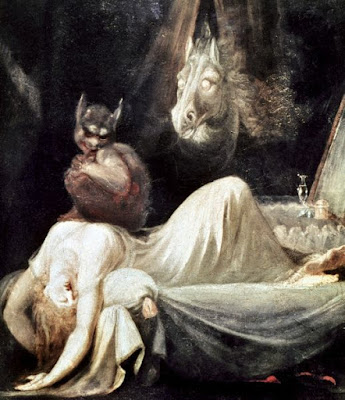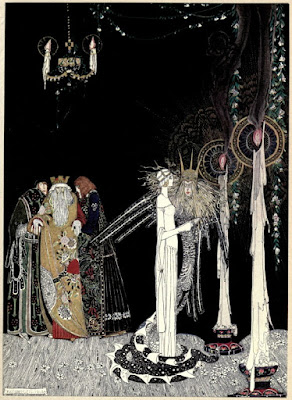Something a little different today. Different in that I talk a lot about the Succubus, but never really anything at all about their male counterpart the
Incubus. Since my next book after the
Basic Bestiary is going to be about Demons and Devils, I figure I better get one detailed here.
The Monster Manual and medieval demonologies are replete with all sorts of "male" demons. The Monster Manual itself only has two female demons, the succubus and marilith, and only one female devil, the Erinyes. Four if you include the Night Hag (but more on that later). Because of this, I have never really seen a need for the Incubus. There is one "Species" the Succubus and she can shapeshift however she feels fit. And for what it is worth that is still true. Though I got to thinking what if the incubus was something else.
Going back to my cover, Fuseli's The Nightmare, there is an imp sitting on the chest of a sleeping woman while a ghostly horse, a Nightmare, looks on. There are two versions of this painting, but both are the same.
The creature on her is an incubus. This got me thinking. What if the incubus is NOT the male version of this:
But rather the demonic version of this:
An incubus is an imp-like demon that is a demonic mockery of the cherubic cupids of Renaissance and Victorian art.
I like it to be honest. They invade women's dreams and appear to be a tall strapping male that makes love to them all night, leaving them drained (Constitution drain). They are kin to the Succubi (they are both Lilim) and might even be the offspring of succubi and humans.
Now...I am still working on a few things for the demon book. One of the reasons they are not in the Basic Bestiary is because I have not worked out all the issues with their stat blocks and all the demonic families I have. I mean are succubi Chaotic Evil, Lawful Evil or Neutral Evil? I have seen them done all three ways. Is the Lamia a monster or are they demons? Still too many unanswered questions. But until then, here is an Incubus.
IncubusSmall Fiend (Demonic, Lilim)Frequency: Very Rare
Number Appearing: 1 (1)
Alignment: Chaotic [Neutral Evil]
Movement: 90' (30') [9"]
Fly: 120' (40') [12"]
Spirit: 240' (80') [18"]
Armor Class: 6 [13]
Hit Dice: 5d8+15** (38 hp)
Small: 5d6+15** (33 hp)
THAC0: 15 (+5)
Attacks: 1 claw or special
Damage: 1d4
Special: See below
Save: Monster 5
Morale: 10 (8)
Treasure Hoard Class: None
XP: 575 (OSE) 660 (LL)
The incubus is sometimes considered to be the male counterpart to the succubus. While a succubus can change shape to male, the incubus is a different, but a related creature. Like the succubus, the incubus can invade the dreams of their victims. This is often how they make their first contact with the victim. In this form, the incubus is merely a spirit and cannot attack or damage. But once they have made contact and their victim, usually a woman of pure and good standing, they will begin their nightly visits.
The incubus can appear as any sort of creature or person the woman desires. If that desire is say forbidden such as the love of a man married to her sister or the head of a church, then incubus' connection will be stronger. During these nightly visits, the incubus will drain 1 point of Constitution from the victim. Any incubus typically has a few victims he sees every night, so one sign of an incubus problem would be many women wasting away over the course of a week. When they reach zero Constitution the incubus will take their soul to be bartered in the lower planes.
The true form of an incubus is that of a gargoyle-like imp creature about 3' to 3½' tall. It has small leathery bat-like wings, a pinched evil little face with a mouth full of sharp teeth, and tiny hands with small sharp claws. They are covered in fur and smell of soured milk, body odor, odor, and brimstone.
An Exorcism spell will remove their spirit forms. A Protection from Evil spell will keep them at bay for the duration. They can only be harmed by magic or magical weapons. Killing an incubus sends it back them the lower planes. Once the threat is abolished victims can heal at the rate of 1 Constitution point of bed rest each week.
Talismans and amulets that protect wearers from demons will work, but only if they are specifically crafted for incubi or succubi.
--
Not bad. Not 100% perfect yet, but I have some time. I still need to work in magic resistance and what demonic abilities all Lilim share.
The Incubus has three different kinds of movement and of course, has the reduced hp of a small creature.











